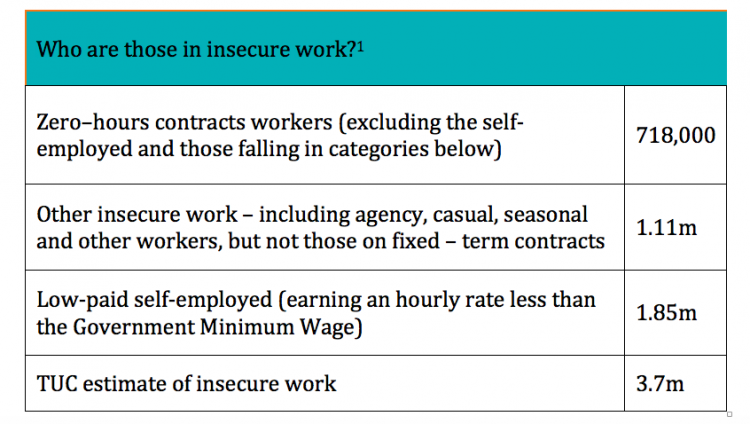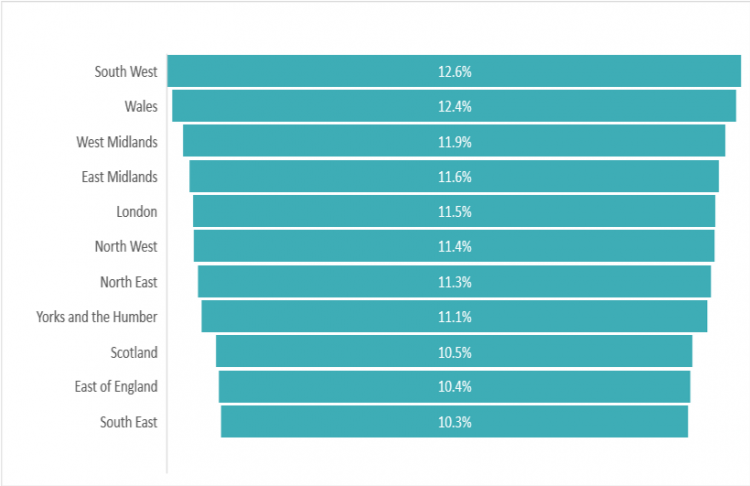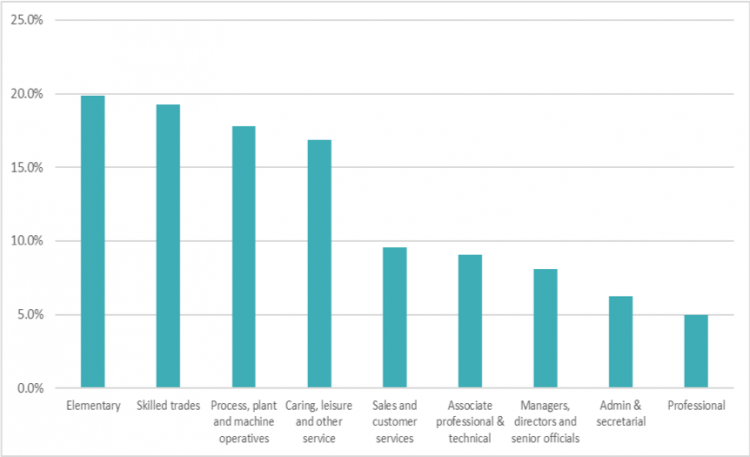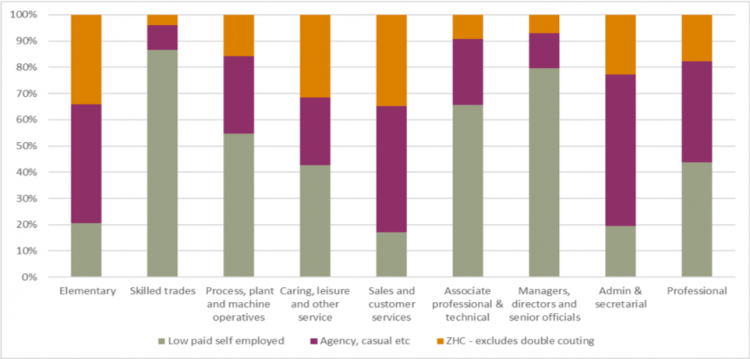Insecure work
The entry of a new Prime Minister into Downing Street provides a fresh opportunity to tackle the scourge of insecure work.
This report examines the extent of insecure work in the UK.
It finds that 3.7 million people are in insecure work due to being among the ranks of the low-paid self-employed, agency, casual and seasonal workers, or on zero-hours contracts.
This is one in nine of the workforce.
Insecure work is widespread in certain occupations, notably caring and leisure, the skilled trades and elementary roles such as kitchen assistants and security guards.
But it has a profound effect on the workers involved who often have no idea what hours they are going to work or how they will pay their bills.
Despite this, there has been little decisive action against insecure work.
What is required is a significant shift in workplace rights to ensure that all that all workers have a decent floor of rights and can benefit from the protection of a union.
New analysis by the TUC shows that at least 3.7 million workers in the UK, around one in nine of the workforce, are in insecure work. Insecure work is not restricted to any particular corner of the country. It is widespread.
In every region of England and in Wales and Scotland, insecure workers make up at least 10 per cent of the workforce.
These include agency, casual and seasonal workers, those whose main job is on a zero-hours contract and self-employed workers who are paid less than the National Living Wage.
Insecure work has a huge impact on those who endure it.
Those in insecure work often don’t know what hours they will work (causing chaos with arrangements like childcare) or whether they will be able to pay their next bills.
Many also miss out on rights and protections that many of us take for granted. These include being able to return to the same job after having a baby and the right to sick pay when they cannot work.
This is blighting the lives of millions of workers. So at the top of the new Prime Minister’s to-do list should be the task of tackling the shameful rise and persistence of insecure work.
People often associate insecure work with the growth of the ‘gig economy’ – app-based services like Uber and Deliveroo. And, as we have shown , this type of work is growing, though often it is undertaken to top-up insufficient wages from other forms of work.
But insecurity is also widespread in jobs that have been around for years.
Our figures show that insecure work extends to:
- one in five (20 per cent) of those classed as elementary roles which includes kitchen assistants, security guards and farm workers
- one in six (17 per cent) of those in caring and leisure roles
- one in five (19 per cent) of those working in skilled trades.
This is nothing to do with billionaire tech boffins in Silicon Valley. It is down to the reluctance of ministers to take action to stop workers from being exploited.
For decent work has been the forgotten issue of the past few years.
The government’s flagship workers’ rights initiative, the Good Work Plan, was inadequate on paper and implementation has been glacial.
The new Prime Minister needs to get a grip of this situation.
We need a new deal for working people so that every worker gets respect, and every job is a good job.
This means:
- a ban on zero-hours contracts and bogus self-employment
- a decent floor of rights for all workers and the return of protection against unfair dismissal to millions of working people
- ensuring workers enjoy the same basic rights as employees, including redundancy pay and family-friendly rights
- new rights so that workers can be protected by a union in every workplace, and when we use social media, so that nobody has to face their employer alone
- new rights for workers to bargain through unions for fair pay and conditions across industries, ending the race to the bottom.
Insecure work pushes an unfair amount of risk onto the individual worker: they often don’t know when they will be working and for how long and how much they will be paid.
Often they miss out on key workplace rights such as:
- the right to return to the same job after maternity, adoption, paternity or shared parental leave
- the right to request flexible working
- the right to protection from unfair dismissal or statutory redundancy pay
- and many insecure workers miss out on key social security rights such as statutory sick pay, full maternity pay and paternity pay.
When estimating the number of people in insecure work the TUC includes:
- those on zero-hours contracts who risk missing out on access to key rights and protections at work, lack income security and face lower rates of pay
- agency, casual and seasonal workers (but not those on fixed – term contracts) who risk missing out on key workplace rights and protections and face lower rates of pay
- the low-paid self-employed who miss out on key rights and protections that come with being an employee and cannot afford to provide a safety net for when they are unable to work.
More detail on workplace rights can be found in Annexe 1.
Insecure work is neither brand new nor is it limited to a small corner of the economy.
Indeed, far from being a niche issue, the TUC’s analysis shows that there are currently 3.7 million people in insecure work, some one in nine workers.
Table 1 - How the TUC estimates the number of people in in insecure work

And insecure work is not something that affects just one corner of the country. In every English region, and in Wales and Scotland, at least one in ten workers is experiencing insecure work.
Chart 1 – Proportion in insecure work – region/nation

Insecure work is not just found among app-based occupations, such as food delivery and taxi driving, though it is rife in these sectors. It is also widespread in many long-standing occupations.
Chart 2 - Proportion in insecure work - by occupation

This includes caring and leisure where nearly half a million of its three million workers, some 17 per cent are in insecure work.
Likewise, one in five of those in elementary roles are in insecure work, as are 19 per cent of those in the skilled trades and 18 per cent of process, plant and machine operatives.
At the other end of the scale, one in 20 professionals and six per cent in administrative and secretarial roles are in insecure work.
Chart 3 shows how the type of insecure work varies in each occupation.
For example, among those classed as elementary workers, the most significant driver of insecure work is the 45 per cent who are agency or casual workers.
The highest proportion of those classed as insecure workers due to the widespread use of zero hours contracts is found in sales and customer services (35 per cent).
Chart 3 – Contribution of form of insecure work

Among those in skilled trades, 87 per cent of insecure workers are classified as such due to being self-employed workers earning less than the National Living Wage.
What this tells us is that insecure work is widespread. And while it takes subtly different forms in different occupations, it requires concerted political will to tackle it.
Stay Updated
Want to hear about our latest news and blogs?
Sign up now to get it straight to your inbox


